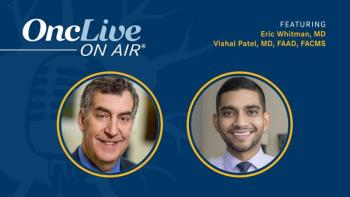
Wagner Weighs In On Research and Development in Angiosarcoma

Michael J. Wagner, MD, talks about the struggle to investigate angiosarcoma, the ways research cooperatives have had recent success in driving the science forward, and the potential for immunotherapy in this disease.
Welcome to OncLive On Air®! I’m your host today, Jason Harris.
OncLive On Air® is a podcast from OncLive®, which provides oncology professionals with the resources and information they need to provide the best patient care. In both digital and print formats, OncLive® covers every angle of oncology practice, from new technology to treatment advances to important regulatory decisions.
In today’s episode, I spoke with Michael J. Wagner, MD, about angiosarcoma for OncLive’s Rare Cancer series. Dr Wagner is a physician with the Fred Hutchinson Cancer Center and an assistant professor with the University of Washington School of Medicine.
Prognosis for angiosarcoma is “dismal,” with a 5-year overall survival (OS) rate of just 24.3% for patients diagnosed from 2005 to 2014. For patients with metastatic disease, the 3-year OS rate is 3.8%.
There is a great unmet medical need in angiosarcoma, and Dr Wagner is optimistic that immunotherapy could be the answer. In 2021, he and his colleagues published findings from the phase 2 DART trial (NCT02834013) evaluating ipilimumab (Yervoy) plus nivolumab (Opdivo) for patients with metastatic or unresectable angiosarcoma. Although only 16 patients could be evaluated for efficacy, investigators observed an overall response rate of 25%, and 2 patients had ongoing responses beyond 12 months.
In our exclusive interview, Dr Wagner talked about the struggle to investigate this rare disease, the ways research cooperatives have had recent success in driving the science forward, and the potential for immunotherapy in this disease.
-------------------------------------------
That’s all we have for today! Thank you for listening to this episode of OncLive On Air®. Check back on Mondays and Thursdays for exclusive interviews with leading experts in the oncology field.
For more updates in oncology, be sure to visit www.OncLive.com and sign up for our e-newsletters.
OncLive® is also on social media. On Twitter, follow us at @OncLive and @OncLiveSOSS. On Facebook, like us at OncLive and OncLive State of the Science Summit and follow our OncLive page on LinkedIn.
If you liked today’s episode of OncLive On Air®, please consider subscribing to our podcast on Apple Podcasts, Spotify, Google Podcasts, Amazon Music, and many of your other favorite podcast platforms,* so you get a notification every time a new episode is posted. While you are there, please take a moment to rate us!
Thanks again for listening to OncLive On Air®.
*OncLive On Air® is available on: Apple Podcasts, Google Podcasts, Spotify, Amazon Music, Audacy, CastBox, Deezer, iHeart, JioSaavn, Listen Notes, Player FM, Podcast Addict, Podchaser, RadioPublic, and TuneIn.




































